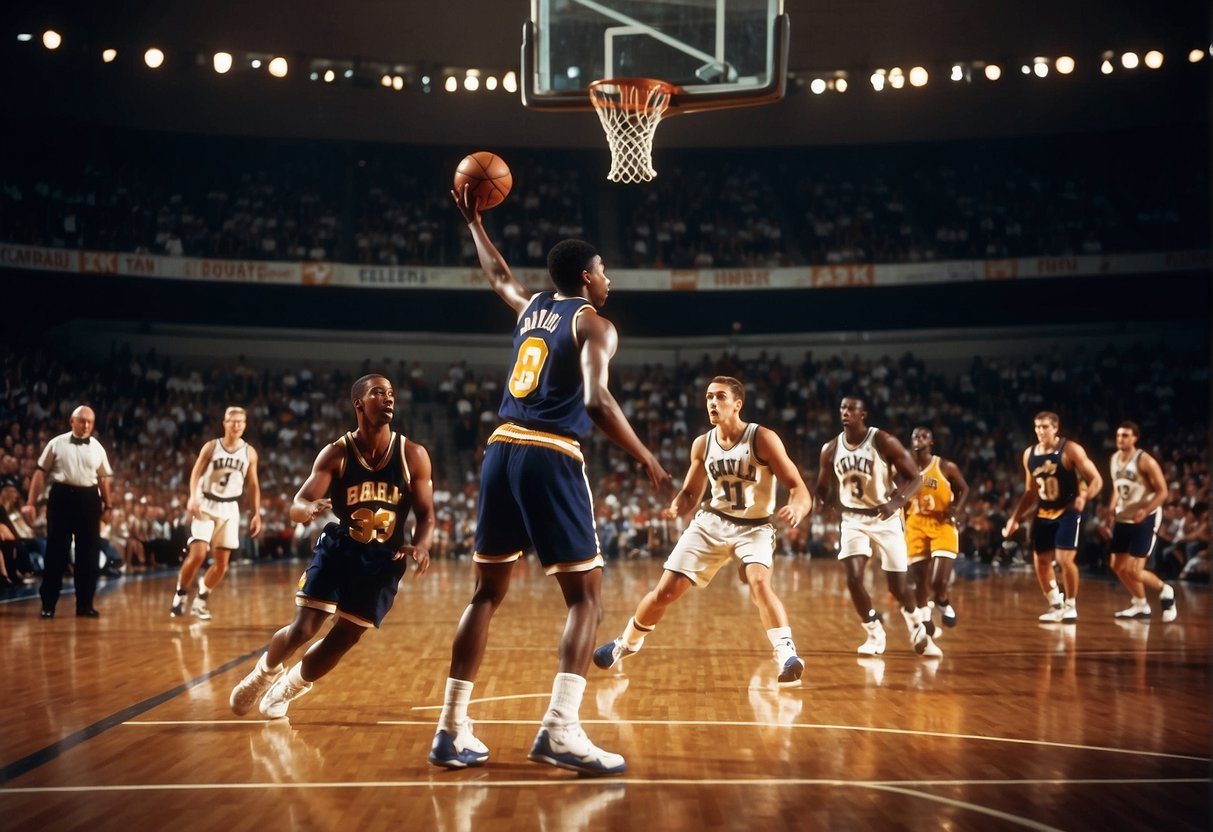Basketball has evolved significantly since its inception in 1891, flourishing into a global phenomenon that captivates fans with its blend of athleticism, strategy, and skill. Throughout NBA history, a pantheon of players has risen through the ranks, leaving an indelible mark on the game and igniting debates about who stands as the greatest of all time. These athletes are celebrated not just for their statistical achievements, but also for their ability to transform teams, define eras, and inspire generations of fans and players alike.
The debate over the best basketball players ever is as old as the league itself, with new chapters added as each season passes. Factors such as scoring prowess, defensive abilities, championship victories, individual accolades, and overall impact on the game are commonly weighed. Names like Michael Jordan, who has been frequently cited as the quintessential icon of NBA excellence, pop up in such discussions, often accompanied by other luminaries such as LeBron James, a versatile player whose career has been marked by record-breaking performances and an unmatched influence on and off the court.
Need Help Beating the Bookies?
Our expert betting tipsters have been taking cash off the bookies since 2014! If you need a helping hand with winning then why not check them out?
Browse Our Tipsters
Premier Greyhound Tips
Michael is Our Dedicated Greyhound Racing Tipster (with Results Dating Back to 2014!)
Visit PROFILE
Systematic Betting
Simple and Effective Horse Racing Tips from a Hugely Popular Member of the Team
Visit PROFILEThis discussion is further enriched by historical figures like Kareem Abdul-Jabbar, a player whose skyhook became the stuff of legends, and whose scoring record stood for decades. The landscape of the NBA is dotted with other extraordinary talents, each bringing their unique skills and achievements to the fore, constructing a rich tapestry that tells the story of the league’s evolution. As the game continues to grow, so too does the list of candidates for the title of the greatest, a testament to the ever-increasing standard of excellence that defines the NBA.
Evolution of the Game

Basketball has undergone significant transformations since its inception, shaped by its players and various rule changes. Adapting to athletic progress and technological advances, the game has continually evolved to maintain its competitive balance and entertainment value.
Rule Changes
The National Basketball Association (NBA), established in 1946, has made numerous modifications to its rulebook, each contributing to the evolution of the game. One significant period of change occurred in 1996, when the league saw the need to adapt to the increasing athleticism and skills of players.
-
Shot Clock: Introduced in 1954, the shot clock revolutionised the pace of the game, ensuring that teams could no longer excessively hold the ball to maintain a lead. This 24-second clock prompted teams to play a more dynamic and fast-paced game.
-
Three-point Line: First tested in 1979, the introduction of the three-point line added a new strategic element to the game, rewarding players with an extra point for long-distance shots, thus changing team tactics and player specialisations.
-
Hand Checking Rule: The league cracked down on defensive hand-checking in the late 1990s, which restricted defenders from using their hands to impede the progress of an offensive player. This rule change aimed to free up play, particularly favouring quick and skilled perimeter players, and contributed to an increase in scoring.
-
Defensive 3-Seconds Rule: Implemented in the 2001-2002 season, this rule prohibits a defensive player from remaining in the key area (or the paint) for more than three seconds without actively guarding an opponent. It was designed to prevent defensive players from unduly clogging the area near the basket, thus opening up the game for offensive players.
Since the mid-1990s, the NBA has also addressed physical play and defence, revising rules concerning flagrant fouls and flopping to prioritise player safety and sportsmanship. Each rule change has been a response to the evolving talent and capabilities of players, as well as to foster a game that is enjoyable to watch and play.
The Greatest of All Time

The pantheon of basketball legends is defined by extraordinary skill, leadership, and impact on the sport. This section celebrates individuals whose contributions have set the standard for excellence in basketball, transcending eras from the pioneers to contemporary icons.
Legends of the Past
Michael Jordan is often the first name mentioned when discussing the greatest basketball players. He captured six NBA championships with the Chicago Bulls and earned five Most Valuable Player (MVP) Awards. His influence extends beyond his scoring prowess; he embodies competitive spirit and clutch performance.
Bill Russell changed the game with his defensive dominance, securing eleven NBA titles with the Boston Celtics, which remains an unmatched record. His leadership on and off the court signified the intersection of sport with social change.
Wilt Chamberlain was a scoring and rebounding machine, notoriously known for recording an astounding 100 points in a single game. His physical dominance was unparalleled during his era.
Larry Bird, a forward for the Boston Celtics, was celebrated for his sharpshooting and basketball IQ. He led his team to three NBA championships and was awarded three consecutive MVP awards from 1984 to 1986.
Kareem Abdul-Jabbar, the NBA’s all-time leading scorer, patented the skyhook and bagged six MVP Awards. His career spanned two decades, securing six championships.
Magic Johnson was synonymous with the Los Angeles Lakers’ “Showtime” era. With his exceptional passing and versatile playing, he snagged five championships and three MVP Awards.
Modern Era Titans
Kobe Bryant, known for his scoring ability and tenacity, continued the Lakers’ legacy with five NBA championships. He was also a two-time Finals MVP and 18-time All-Star.
LeBron James has been a central figure in modern basketball, excelling in nearly every facet of the game. With four NBA championships and four MVP Awards, his ongoing career continues to shape the league’s landscape.
Tim Duncan, often hailed as the greatest power forward, was the cornerstone for the San Antonio Spurs’ five NBA titles. His fundamentals and quiet leadership earned him the nickname “The Big Fundamental”.
Hakeem Olajuwon merged finesse with power, leading the Houston Rockets to back-to-back championships in the ’90s. He is famed for his “Dream Shake” and remains one of the all-time leaders in blocks.
Oscar Robertson was a trailblazer for triple-double performances, showcasing a versatile and balanced approach to the game. Though most of his career predates the modern three-point line and nuances, his legacy as a playmaker and scorer stands firm.
Positions and Play Styles
Basketball is a sport that celebrates diverse abilities, where each position on the court requires a unique set of skills and play styles. From the agility of point guards to the dominance of big men, each role contributes to the team’s dynamic.
Dominant Big Men
The centre and power forward positions, traditionally known as big men, are often the tallest players, using their size to score and defend near the basket. They excel at scoring through post moves and often lead in rebounds. Kareem Abdul-Jabbar, known for his skyhook, dominated as a centre and became the NBA’s leading scorer by employing his unmatched height and skill set.
Skilful Point Guards
Point guards orchestrate the offence, often leading in assists and facilitating team play. They possess exceptional dribbling, passing, and court vision, enabling them to set the tempo and make strategic plays. Notable point guards like Stephen Curry revolutionised the position by combining skilful playmaking with unprecedented shooting ability.
Versatile Wings
Playing as small forwards or shooting guards, versatile wings are known for their all-around performance. These players are adaptable, often switching between scoring and creating opportunities for teammates. LeBron James epitomises this versatility, frequently leading his team in multiple categories, be it scoring, assists, or defensive plays.
Major Achievements and Awards
This section outlines the pivotal honours that distinguish the greatest basketball players, focusing on their scoring prowess, value to their teams, defensive achievements, and the ultimate goal of championship titles.
Scoring Titles
The NBA has seen prodigious scorers throughout its history, but leading the league in points is a distinguished feat. LeBron James made headlines by surpassing Kareem Abdul-Jabbar as the NBA’s leading scorer in February 2023.
MVP Contenders
The Most Valuable Player (MVP) award recognises the absolute best talent in the league each season. Legends like Moses Malone have claimed the MVP award on multiple occasions, showcasing their irreplaceable impact on the court.
- Finals MVP: Historically, players like Jerry West have earned the Finals MVP award for their outstanding performances during the crucial playoffs, further cementing their legacy in NBA history.
Defensive Accolades
A critical part of the game is defence, with the Defensive Player of the Year award illuminating the players who excel. Scottie Pippen, for instance, was renowned for his defensive skill, often tasked with guarding the opposing team’s best player.
Championship Success
Championships are the pinnacle of NBA success. Players are often judged by the number of rings they accumulate over their career as it signifies their ability to win when it matters most. Each championship team has had standout performers who’ve also secured the Finals MVP, a testament to their decisive role in capturing the title.
Influence and Legacies
The most exceptional basketball players transcend their statistics and achievements on the court. They influence popular culture, inspire future athletes, and permanently alter the way the game is played.
Cultural Impact
Basketball stars have consistently held sway over media and popular culture. Michael Jordan became a global icon not just through his athletic prowess but through successful marketing campaigns, like Nike’s Air Jordan trainers, which cemented his status outside the sports world. LeBron James has continued to shape athlete representation in the media by establishing his own company, SpringHill Entertainment, producing content that blends entertainment with social commentary. These athletes extend their influence beyond the court, impacting fashion, entertainment, and social issues.
Changing the Game
Players who change the game do so by introducing new skills or excelling to such an extent that they inspire changes in basketball strategy and even rules. Wilt Chamberlain’s dominant physicality led to several rule changes, including widening the lane and instituting offensive goaltending. Stephen Curry’s unrivalled three-point shooting has led teams to prioritise long-range shooting, thus fundamentally changing offensive strategies in modern basketball.
Their legacies are measured not just by victories or points scored, but by the indelible marks they leave on the sport. This impact ensures they’re remembered as much for how they played the game as for their athletic accomplishments.
Statistics and Records
In the realm of basketball, statistics and records provide a quantifiable measure of a player’s contributions and achievements on the court. These metrics are essential for comparing the all-time greats across different eras of the game.
Career Milestones
Points:
- Kareem Abdul-Jabbar holds the all-time scoring record with an impressive 38,387 points.
- Karl Malone is second with 36,928 points, and LeBron James follows closely and continues to add to his tally.
Rebounds:
- The top career rebounder is Wilt Chamberlain with 23,924 rebounds.
- Bill Russell is a close second having secured 21,620 rebounds.
Assists:
- John Stockton dominates the assists category with 15,806 assists.
- Players like Jason Kidd and Steve Nash also feature prominently in the all-time assists leaderboard.
Steals and Blocks:
- John Stockton leads in career steals with a total of 3,265.
- Hakeem Olajuwon has the most career blocks totalling 3,830.
Seasonal and Game Highs
Individual game and seasonal highs represent the peak of performance in specific areas.
Points:
- Wilt Chamberlain scored 100 points in a single game, the highest in NBA history.
- Michael Jordan has the highest career playoff scoring average of 33.4 points per game.
Rebounds:
- Wilt Chamberlain also owns the single-game rebound record with 55.
- Seasonally, Bill Russell averaged 22.5 rebounds per game in the 1960-61 season.
Assists:
- Scott Skiles holds the record for most assists in a game at 30.
- John Stockton averaged an outstanding 14.5 assists per game during the 1989-90 season.
Steals and Blocks:
- Kendall Gill and Larry Kenon are tied for the most steals in a single game with 11.
- Elmore Smith holds the record for blocks in a game with 17.
- The highest average of blocks per game over a season is 5.56 by Mark Eaton in the 1984-85 season.
Comparison and Rankings
In the realm of basketball, rankings serve as a pivotal tool for assessing the prowess and legacies of players across different eras. While the debate continues, a few names constantly surface as the greatest players of all time.
Cross-Era Comparisons
Comparing players from various basketball eras is a complex task due to the evolution of the sport’s dynamics, rules, and athleticism. However, figures like Michael Jordan, LeBron James, and Kareem Abdul-Jabbar have been lauded for their exceptional skills and contributions, thus securing their positions at the summit of most rankings. These players have made indelible marks on the game, transcending their respective eras and setting benchmarks for both skill and success.
- Michael Jordan: Often cited as the synonym for greatness in basketball, Jordan’s six championships with the Chicago Bulls and his overwhelming influence on both ends of the court solidify his top-tier ranking.
- LeBron James: An embodiment of versatility, James has also vied for this position, with a career that spans over two decades and includes multiple championships and MVP awards.
- Kareem Abdul-Jabbar: As the NBA’s all-time leading scorer and a six-time MVP, Abdul-Jabbar’s skyhook shot and dominant presence under the basket have earned him a high place in any ranking.
Positional Rankings
When it comes to positional rankings, pinpointing the top players requires a thorough examination of their impact within their specific roles. Here’s a glimpse at some of the players who have redefined their positions:
Point Guards
- Magic Johnson: Revolutionised the role with his unprecedented size and playmaking ability.
Shooting Guards
- Kobe Bryant: Exhibited unmatched scoring ability and tenacity, often compared to Jordan.
Small Forwards
- LeBron James: Combines power and precision to dominate this position.
Power Forwards
- Tim Duncan: Known for his consistency and fundamental play which anchored the San Antonio Spurs.
Centres
- Shaquille O’Neal: Dominated the paint with his sheer physicality and charisma.
These players have not only dominated the rankings within their positions but have also been integral in defining the characteristics that are now expected of players in these roles.
External Factors
Assessing the best basketball players of all time involves not just their on-court performance but also how external factors such as media portrayal and economic impacts influence their recognition and legacy.
Media Portrayal
The media’s depiction can substantially shape public perception and historical stature of a basketball player. For instance, a player in a high-profile market such as Cleveland may receive more attention in comparison to equally talented players in smaller markets, due to the more significant media presence. Sports journalists and media outlets often highlight players’ career milestones, notable performances, and personal narratives, which can affect their public image and legacy.
- Highlighting: Media often focusses on personal achievements and captivating storylines.
- Market Size: Players in larger markets may get disproportionate media coverage.
Economic Impact
A player’s economic influence can be vast, affecting ticket sales, merchandise, sponsorships, and even team valuations. The presence of a supreme talent can rejuvenate the local economy of a team like Cleveland, with increased game-day revenue and heightened national interest. Moreover, their economic value can extend beyond their playing career, affecting their ranking among the greatest through sustained visibility and brand partnerships.
- Ticket Sales Increase: Star players can significantly boost attendance.
- Merchandising: Increased demand for team merchandise featuring the player.
- Sponsorships: Lucrative deals can elevate a player’s profile.
- Team Valuations: The presence of a star player can raise a team’s financial value.
Conclusion
The discourse surrounding the greatest basketball players is ever-evolving, influenced by new records and the dynamic nature of the NBA. As of February 2023, LeBron James’ phenomenal achievement of surpassing Kareem Abdul-Jabbar as the NBA’s leading scorer represents the latest milestone in an ongoing journey of basketball excellence.
A constellation of stars ranges from past legends such as Kareem Abdul-Jabbar, who brought finesse and longevity to the game, to the indomitable force that was Shaquille O’Neal, whose physicality and charisma left an indelible mark on the sport. Their contributions underscore the malleability of greatness, shaped not only by statistics but also by the impact they have on teams, fans, and the global community.
- Kareem Abdul-Jabbar: Synonymous with consistency and skyhook precision.
- LeBron James: A paradigm of versatility and scoring prowess.
- Shaquille O’Neal: The embodiment of dominance in the paint.
Basketball-Reference.com’s metric of Win Shares highlights players who have been instrumental in leading their teams to victory through individual performance. These statistics, alongside the myriad other metrics and accolades, are crucial in assessing the impact of a player’s career.
This discourse invites enthusiasts to consider not just the numbers, but the narratives they weave into the rich tapestry of basketball history. The players mentioned herein, among others, have each shaped their eras and set new horizons for those who follow, epitomising what it means to be among the greatest in basketball.
Frequently Asked Questions
Who is considered the greatest NBA player in history?
Michael Jordan is widely regarded as the greatest NBA player of all time. His six championships and five MVP awards with the Chicago Bulls are often cited as evidence of his dominance.
Which players are often recognised in the top five of all-time NBA rankings?
Along with Michael Jordan, the top five includes Bill Russell, Kareem Abdul-Jabbar, LeBron James, and Magic Johnson. These players are celebrated for their skill, impact, and championship success.
What factors contribute to a basketball player being classified as a legend?
A player’s legacy is shaped by their individual records, leadership qualities, impact on their teams’ success, and influence on the game as a whole. Consistency at a high level over many seasons is a key factor.
Who are the most influential NBA players in the history of the league?
Players such as Michael Jordan, LeBron James, and Bill Russell are enormoulsy influential due to their excellence on the court and their ability to transform and popularise the sport globally.
Can current NBA players be ranked among the best of all time?
Yes, current players like LeBron James and Stephen Curry are often included in conversations about the best players of all time. Their ongoing careers and continuous achievements enable them to climb the historical rankings.
Which NBA player holds the title of being the wealthiest?
Currently, Michael Jordan is the wealthiest NBA player in history, with a net worth resulting from his basketball career earnings, endorsements, and business ventures, including ownership of the Charlotte Hornets.





